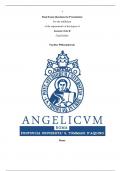1
Final Exam Questions for Presentation
For the fulfillment
of the requirements of the degree of
Licenza Ciclo II
Chad Deffler
Facultas Philosophorum
Roma
, 2
October 2020
Lista aggiornata dei temi per l’esame orale di licenza
1. La divisione ed il metodo delle scienze speculative secondo S. Tommaso
pg.3
2. La filosofia della natura e la sintesi ilemorfica
pg.6
3. La rivoluzione scientifica e le sue implicazioni filosofiche pg.9
4. L’antropologia di Platone e quella di Aristotele pg.13
5. L’anima e la sua immortalità secondo San Tommaso pg.16
6. Processo e valore della conoscenza umana secondo San Tommaso pg.20
7. L’oggetto della metafisica secondo San Tommaso pg.23
8. Esistenza di Dio e attributi divini secondo San Tommaso
pg.27
9. La legge naturale pg.30
10. Fondamenta dell’etica secondo Kant e genealogia della morale secondo Nietzsche pg.34
, 3
Question 1: . La divisione ed il metodo delle scienze speculative secondo S. Tommaso
“It has been already remarked that each science is differentiated by its formal object. The
material object is not unfrequently common to many sciences; whereas the formal object, i.e. the
real form, or, if you will, the point of view under which the former is considered, serves to
distinguish essentially one science from another.”1
Thomas divides the theoretical science according to:
• their relation to being (secundum esse) and
• the intellects knowing.
This division is taken from question 5 article 1 of his commentary on Boethius de Trinitate.
I. The first 2 divisions are those objects of speculation(Speculabili2) whom are dependent on
matter in order to have being independently from the mind. They are as follows:
I. physics or natural science which study material being in motion.
1. Physics needs sensible matter to be understood.
II. mathematics is the second division
1. depend on mater for their being but can be known apart from matter.
2. And so are a beings which do not depend upon sensible being to be understood.3
3. Only formal “Nam mathematica non demonstrat nisi per causam formalem”4
III. Metaphysics is the third theoretical science comprises those entities which
1. do not depend on matter for:
a. Their being or
b. Their understanding
I. These fundamentally include “substantia, qualitas, ens, potentia,
actus, unum et multa et huiusmodi.”5
II. but also include angels and God as well
➢ so that metaphysics is the study of these principles which can both be in matter and not,
but do not depend on matter for their being. Principles like act, potency or causality can
be found in non-material beings.
IV. method “For Aristotle, every science, to be a science, must study a formally distinct
generic subject, be based on certain and necessary first principles proper to that subject,
1
Harper, Thomas S.J.: The Metaphysics of the School. 1879
https://www3.nd.edu/~maritain/jmc/etext/tmots012.htm
2
Aquinas, Thomas: Super libros Boethii De Trinitate, Q. 5, a. 1, responsio. P.268
3
Aquinas, Thomas: Super libros Boethii De Trinitate, Q. 5, a. 1: "Utrum sit conveniens divisio qua dividitur
speculativa in has tres partes: naturalem, mathematicam et divinam..quae dam dependent a materia secundum esse et
intellectum, sicut ilia, in quorum diffinitione ponitur materia sensibilis .... Quaedam vero sunt, quae quamvis
dependeant a materia secundum esse, non tamen secundum intellectum, quia in eorum diffinitionibus non ponitur
materia sensibilis, sicut linea et numerus
4
Aquinas, Thomas: Opera Omina, leonis ed. Tomus XIII, Romae 1884. Lib.I Lectio I.5, pg.5
5
Aquinas, Thomas: Super libros Boethii De Trinitate, Q. 5, a. 1, responsio. Found in footnote 10 of John F. Wippel.
The Review of Metaphysics Vol. 31, No. 3 (Mar., 1978), pp. 431-470
, 4
and be able to demonstrate with certitude at least one property of that subject through one
or more of the four causes. Hence every science has its own criteria of the kind of truth
proper to it.”6
V. Order. natural science “rationabiliter” from the senses to movement looking at all casues,
mathematis “disciplinabiliter” from formal casues which generate new knowelge ie
1+1=2,2+2=4…, and metaphyics “intellectualiter” from first principles and more
universal simple forms such as truth goodnees and unity.7
6
Ashley Benedict M., O.P.: The Way Toward Wisdom: An Interdisciplinary and Intercultural Introduction. Indiana
200. Pg. 345 (pdf version)
7
Aquinas, Thomas: Sententia super Physicorum. lib. 1 lect. 1 Commento alla Fisica di Aristotele - vol. 1. Edizioni
Studio Domenicano, 2004. Pg. 48 “Utitur autem istis nominibus disiunctim et non copulatim ad designandum quod
non omnis scientia per omnes causas demonstrat. Nam mathematica non demonstrat nisi per causam formalem;
metaphysica demonstrat per causam formalem et finalem praecipue, et etiam agentem; naturalis autem per omnes
causas.”




